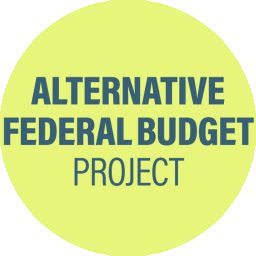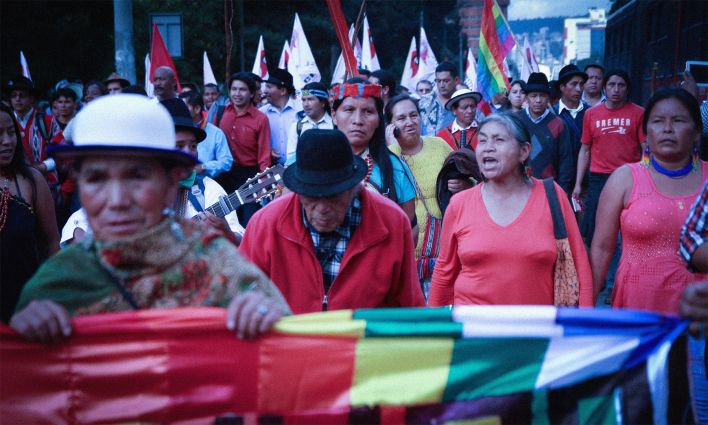Introduction
Canadian trade policy in 2023 is pulled in different directions by geopolitics, ideology, and powerful sectoral lobbies. Entrenched neoliberal orthodoxy and regulatory capture by fossil fuel, pharmaceutical, and mining interests hamper efforts to make trade truly more inclusive. At the World Trade Organization and in bilateral trade negotiations, Canada promotes a corporate agenda that is out of step with the needs of working people and our planet.
Overlapping shocks to global patterns of capital accumulation—from the COVID-19 pandemic, war in Ukraine, U.S.–China tensions, climate change, high inflation, etc.—have jolted governments into taking a stronger role in the economy. But efforts to re-shore manufacturing must cement international cooperation, not U.S. hegemonic interests.
Done right, a fair and equitable global transition would advance the fundamental rights and freedoms of workers and principles of decent work, including the right to collective bargaining and the freedom to unionize.
Overview
The 2024 AFB recalibrates Canada’s trade policy in support of a fair and equitable global transition and more peaceful international economic relations. It rejects imperialism and colonialism while empowering workers and others sidelined or exploited by unsustainable, corporate- dominated global value chains. At its heart, this year’s AFB promotes a feminist trade policy in the service of life, not profit.
Investor–state dispute settlement
The international system of private justice known as investor–state dispute settlement (ISDS) is going through a credibility crisis. In July, the European Union announced it was leaving the Energy Charter Treaty, the world’s largest and most-litigated investment treaty, because it “is not in line with the EU’s investment policy and law and with the EU’s energy and climate goals.”1 The Intergovernmental Panel on Climate Change is worried that the prevalence of ISDS threatens the global response to the climate emergency.2 In 2015, Victoria Tauli-Corpuz, former Special Rapporteur on the Rights of Indigenous Peoples, found that ISDS has “significant potential to undermine the protection of [Indigenous Peoples’] land rights and the strongly associated cultural rights.”3
ISDS lets foreign investors bypass domestic courts to sue countries, sometimes for billions or even tens of billions of dollars, when the decision of a government, court, or other public body negatively affects their investment or future profits. U.S. investor Ruby River Capital is suing Canada for an astounding $20 billion (USD) under the ISDS provisions of the North American Free Trade Agreement (NAFTA) because Quebec said no to a proposed liquid natural gas facility and pipeline that would have increased Canada’s greenhouse gas emissions and impinged on the cultural rights of the Innu First Nation.
The Trudeau government agreed to remove ISDS from the Canada–United States–Mexico Agreement that replaced NAFTA in July 2020. Deputy Prime Minister Chrystia Freeland claimed this move “strengthened our government’s right to regulate in the public interest, to protect public health and the environment.”4 Yet Canada continues to negotiate new treaties that include ISDS with the aim of strengthening the legal hand of Canadian investors and firms abroad when faced with public or governmental opposition to their projects, especially in the extractives sector.
Culture and trade
Since the 1980s, Canada has sought to exempt the cultural sector from liberalization in Canadian trade and investment agreements. Multilaterally, Canada campaigned for the UNESCO Convention on the Protection and Promotion of the Diversity of Cultural Expressions (2005 Convention). But over the past 20 years, Canada’s success in achieving a strong cultural exemption in new trade deals has been mixed.
The Canada–European Union Comprehensive Economic and Trade Agreement endorses the principles of the 2005 Convention and provides comprehensive exemptions for cultural industries from all relevant chapters. However, there is no cultural exemption in the Comprehensive and Progressive Agreement for Trans-Pacific Partnership, where Canada has merely taken reservations for non-conforming measures.
While the Canada–U.S.–Mexico Agreement improved upon the NAFTA cultural industry exemption, the definition of culture in the new treaty is limited and outdated. As virtually all cultural expressions are now digital, relevant agreements need to be negotiated or updated to preserve cultural sovereignty in the digital age.
Inclusive trade
Canada’s inclusive trade agenda is not living up to its potential to be a progressive alternative to neoliberal dogma. In general, it is interested in how to encourage more varied groups of businesses (e.g., women-owned, “minority”-owned, Indigenous-owned) to engage in international trade.
Inclusive trade does not problematize the structural inequalities that the rules-based international trading order sustains—and which transnational firms exploit to generate profits.
Strong intellectual property rights for Big Pharma and Big Tech in new trade deals wall off knowledge and compromise privacy. Restrictions on food and health policy space and the liberalization of services, including public services, disempower and increase costs for low-income groups, making life difficult. These facts fundamentally undermine the government’s claims to be forging a feminist foreign policy.
Gender
Following the lead of Latin American countries, Canada now regularly integrates gender-based provisions in its trade and investment agreements, but they are rarely enforceable. Most, though not all, new trade deals undergo a gender-based analysis plus (GBA+) that is unique to Canada but which is over-reliant on problematic economic modelling. While these efforts set important precedents, entrepreneurial bias in Canada’s gender and trade agenda limits its potential to make a difference in the lives of women in Canada or in Canada’s trading-partner countries.5
Labour
Over the past three years, the U.S. has used a Rapid Response Labour Mechanism (RRLM) in the Canada–U.S.–Mexico Agreement more than 10 times to target intransigent employers in Mexico. Canada requested its first RRLM investigation only this year to contest alleged labour violations at the global automotive supplier Fränkische. The case resulted in workers voting in June to join the democratic Sindicato Independiente Nacional De Trabajadores Y Trabajadoras De La Industria Automotriz (SINTTIA) union. Despite the positive track record of this novel labour enforcement tool, Canadian officials are reluctant to include a similar process in potential trade agreements with the Association of Southeast Asian Nations (ASEAN), Indonesia, or the United Kingdom. Unlike other jurisdictions, notably the United States, Canada does not currently provide dedicated and assured labour market support for trade-impacted workers. This is an even greater oversight in a period of transition from carbon-intensive to cleaner forms of production, power generation, and transportation.
Indigenous Peoples
Canada has expanded and strengthened the exceptions it seeks in trade and investment treaties for government measures taken in compliance with Canada’s legal obligations with respect to Indigenous rights and title. At the same time, Indigenous Peoples have no standing in trade and investment disputes involving their rightful jurisdictions. The Indigenous Peoples Economic and Trade Cooperation Arrangement, which Canada has endorsed, promises to promote international trade and investment policies that increase Indigenous participation in trade, enhance trade between Indigenous Peoples, and further Indigenous “worldviews regarding the sustainable management of natural resources in order to advance economic development.” However, the arrangement has few legal teeth. Nowhere does it acknowledge the ways in which international trade and investment policies can impinge on Indigenous Peoples’ rights by privileging foreign investors operating on Indigenous lands and waters.
Disability
As more frequent users of health services and medications, people with disabilities are disproportionately impacted by provisions in Canadian trade agreements that increase drug prices by extending patent terms or that foster the private, for-profit delivery of public services. Canada would not have agreed to the patent term restoration clauses in the Canada–EU Comprehensive Economic and Trade Agreement and the Canada–U.S.–Mexico Agreement had the federal government’s negotiating mandate been informed by a proper disability impact assessment.
Actions
Canadian trade policy should strive to be independent; accommodating of the economic development objectives of other countries; aligned with the United Nations Declaration on the Rights of Indigenous Peoples and with principles of sustainable development; and subservient to the achievement and enjoyment of human rights, labour rights, and international environmental law and climate commitments.
The AFB will direct Global Affairs Canada to phase out investor– state dispute settlement (ISDS) wherever it exists in Canadian trade and investment deals and to take ISDS off the table in current trade negotiations with Mercosur, Indonesia, India, Indonesia, Ecuador, and the Association of Southeast Asian Nations (ASEAN). The department will create a team within the trade negotiations branch dedicated to removing ISDS from Canada’s network of free trade and investment treaties. The team’s mandate will include entering negotiations with the European Union with the aim of removing the planned investment court system (a type of ISDS) from the Canada–EU Comprehensive Economic and Trade Agreement. Canada will request a side-letter with the United Kingdom disapplying ISDS in the Comprehensive and Progressive Agreement for Trans-Pacific Partnership as countries ratify the U.K.’s accession to the treaty.
The AFB will shift the focus of procurement reforms announced in the 2023 budget from reciprocal to social procurement. The government will find ways to maximize the value of Canadian goods, services, and labour in federal and provincial public contracts. This will include the creation of set-aside programs in which at least five per cent of federal contracts are reserved for women-owned businesses, at least five per cent for so-called minority-owned businesses, and between five and 10 per cent for Indigenous-owned businesses. Wherever possible under Canada’s trade agreements, federal transfers for provincial infrastructure, such as roads and urban transit, will come with Buy Canadian conditions and other social and environmental criteria attached. Suppliers that cannot meet mandatory due diligence reporting requirements related to human and labour rights in their supply chains will be excluded from federal procurement opportunities.
The AFB will enhance the government’s inclusive trade agenda by making strong language on worker rights (including migrant workers), the rights of Indigenous Peoples, human rights (including 2SLGBTQ+ rights), gender, and disability permanent, binding, and non-negotiable features of all Canadian trade agreements. Global Affairs Canada will establish transparent and inclusive consultative bodies to facilitate bottom-up monitoring and enforcement of these treaty provisions—in Canada and in trading-partner countries—through state-to-state dispute settlement, similar to how the rapid-response labour mechanism functions in the Canada–U.S.–Mexico Agreement.
The AFB will expand on improvements to Canada’s labour provisions in the Canada–U.S.–Mexico Agreement by ensuring all future trade agreements: 1) expand the application of the Rapid Response Labour Mechanism (RRLM) to more sectors, including agriculture; 2) include the rights of migrant workers as a priority for protection; and 3) ensure that any RRLM applies to a wide range of prohibited activities, specifically gender violence and harassment, child labour laws, health and safety violations, and other minimum standards of work. Funding will be provided to organizations representing women workers and to other civil society organizations to ensure that workers, particularly marginalized workers like women, Indigenous Peoples, gender-diverse people, racialized workers, and others, are aware of their rights.
The AFB will introduce a federal trade adjustment program for workers who face job loss, reduced wages, or diminished work hours resulting from increased imports, trade disputes, or other trade-related matters. The program will operate in tandem with the AFB’s proposed Fair and Equitable Transition Benefit (see chapters on fair and equitable transition and industrial strategy) to ensure that all workers impacted by economic transitions receive robust social support.
The AFB will instruct Global Affairs Canada to develop a disability lens for international trade policy and trade agreements in close partnership with people with disabilities and the civil society organizations that represent them. People with disabilities, particularly women and gender- diverse people with disabilities, are invisible in Canada’s trade policy.
The AFB will establish a permanent Indigenous advisory committee to take part in all Canadian trade negotiations, ensuring that there is gender and regional balance among committee members. The AFB will also commit $60 million over five years to enhance First Nations’ capacity to engage and participate in Canadian international trade delegations and in trade negotiations.
The AFB will direct Global Affairs Canada to ensure that trade and investment treaties include a comprehensive cultural exemption with a definition that ensures all cultural expressions are covered. Multilaterally, Canada will work with the 151 other parties to UNESCO’s Convention on the Protection and Promotion of the Diversity of Cultural Expressions to ensure its principles and objectives are included in all future trade and investment agreements, including those covering the digital economy.







